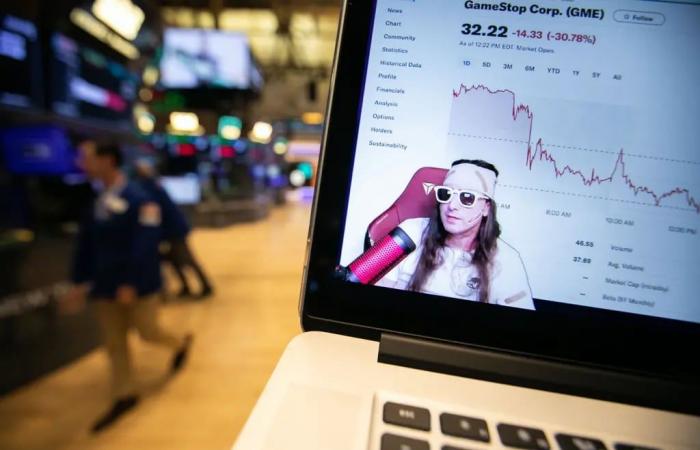Bloomberg — As a new bout of GameStop Corp. (GME) fever gripped the meme stock faithful, followers of stock market influencer Keith Gill were waiting for a moment: The day their hero, aka “Roaring Kitty,” a.k.a. “Deep F–ing Value”, became a billionaire.
The idea was not far-fetched. Over the course of two weeks, Gill had been posting footage of a massive turnout at GameStop and his call options in a portfolio that peaked at more than $550 million on June 6. Although he has added even more shares since then, the dollar value of his holdings has fallen along with the company’s stock.
See more: Meme actions are not the only reason why companies should follow the networks
With stocks little changed since the early days of their latest mania, a new kind of anxiety is creating among Wall Street and retail traders alike.
The original 2021 GameStop rally shook the idea of short selling to the core, eroding the appeal of betting against a faltering company when you could end up feeling the wrath of Redditors. This time, the existential question revolves around what counts as market manipulation.
Does posting a meme, which can bring instant profit, violate the spirit of free and fair markets? Has the David vs. Goliath nature of meme stocks changed? What if Roaring Kitty was the Goliath? And how exactly did she build a position larger than that of Charles Schwab Corp.
“The original meme stock trend was us versus them, with ‘them’ being the guys shorting millennial-favorite companies like GameStop,” said Steve Sosnick, chief strategist at Interactive Brokers. “But I’m not sure who ‘they’ are anymore.”
Gill did not respond to a request for comment.
Losing charm
The populist leader of a short squeeze that shook Wall Street in the original meme stock rally of 2021, Gill is losing his folksy charm, at least to some fans. Trading firms and even some former fans view Gill with more suspicion, as Redditors raise questions like: “How is Roaring Kitty’s return not a basic pump and dump scheme?”
By Thursday, snapshots from Gill’s brokerage account suggested he had unwound a previous position of 120,000 call options and added more GameStop, bringing his portfolio to about 9 million shares of the video game retailer, worth more than $262 million. (Gill’s last position from 2021 showed he had 200,000 shares worth more than $30 million; GameStop did a four-for-one stock split in July 2022.)
When Gill’s stock skyrocketed in price again, GameStop took advantage of the volatility to sell more than $2 billion worth of shares.
GameStop Corp. Photo: Michael Nagle/Bloomberg(Michael Nagle)
In total, anyone who bought stocks in the past month and held them was just as likely to lose money as to make profits. For some, an important difference is that hedge funds and other Sophisticated investors have adapted compared to three years ago and are likely to come out ahead, at the expense of Gill’s retail fans.
“Some of the quant managers have models for looking at price trends and those models are extremely quick to exit stocks if they see significant downside volatility,” said Don Steinbrugge, chief executive of Agecroft Partners, which helps hedge funds raise money. “At some point retail investors are going to wake up and realize that there is a lot of danger.”
Concern about handling
The episode brought to the fore questions about what constitutes market manipulation. He Wall Street Journal reported that the brokerage E*Tradeowned by Morgan Stanley, was considering banning Gill from its platform over such concerns, after previously banning access to other popular personalities such as Dave Portnoy, the founder of Barstool Sports what are you doing streaming as Davey Day Trader and that he said he had been kicked out of the brokerage.
A spokesperson for E*Trade declined to comment.
What is unique about Gill’s case is that market manipulation usually involves driving up a price to benefit from the movement of the stock, said Craig Marcus, partner and co-chair of the capital markets group at law firm Ropes & Gray. If Gill’s snapshots are real, that obviously has not been the case, he said.
“You can disagree with his thesis about stock value, but if all you’re doing is executing your thesis and not doing manipulative things to make a profit,” it’s hard to prove malicious intent, Marcus said in an interview.
See more: Stopping the meme stock rally: GameStop and AMC fell 20% this Wednesday
To be sure, Gill was accused of using his influence to manipulate prices even three years ago, when he first appeared on the public scene. In 2021, A lawsuit against Gill and MassMutual alleged that he was manipulating markets with his enormous influence on certain securities.
“Three years ago this was funny”said Peter Atwater, associate professor of economics at William & Mary. “People have found it more annoying than amusing, and that to me is an indication that this behavior is unlikely to be allowed to continue.”
When Gill scheduled a long-awaited return to YouTube on June 6 without giving details about what he would talk about, the stock soared nearly 50%, adding US$16 billion to its market value in a matter of hours.
In it livestream, which garnered hundreds of thousands of viewers, Gill vamped for about an hour against the backdrop of GameStop’s wildly fluctuating stock price. He seemed to sense the possibility that he would attract greater scrutiny from fans, regulators and trading professionals.
“Do I have to be careful what I say here?” he asked.
Read more at Bloomberg.com






